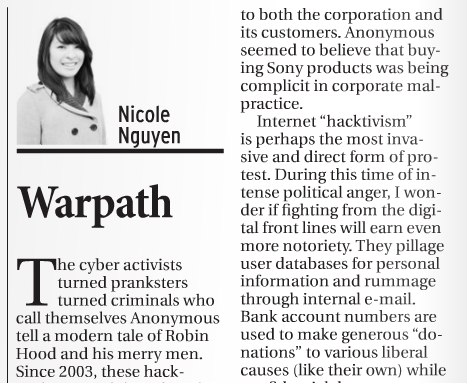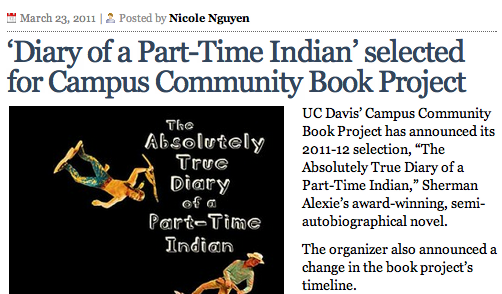Appeared in The California Aggie on March 19, 2012.
The cyber activists turned pranksters turned criminals who call themselves Anonymous tell a modern tale of Robin Hood and his merry men. Since 2003, these hackers have used their digital know-how for “good”, attacking only those who they deem to be wicked and corrupt. Well, until they were detained.
On March 5, the FBI plucked the last of a group of six hackers from his Chicago home late in the night. The hackers of LulzSec, AntiSec and Internet Feds, offshoot groups who align themselves closely with Anonymous, were charged with various crimes a day later. The group was ousted by their leader, Sabu, who was arrested in August. The full extent of this betrayal will surely unfold over the next couple months. It will be interesting to see if the indictment of this group will lead to other arrests and, ultimately, to the downfall of Anonymous.
This story of vigilante justice may not end well for these Anonymous members — but perhaps for good reason. The hackers set out to right the wrongs of corporate and governmental institutions, but their actions were hardly altruistic.
Part of Anonymous’ motto, “We are Legion,” comes from a story in the Bible. Jesus encounters a man possessed by an evil spirit, and asks his name. The spirit replies, “My name is Legion. For we are many.” Legion, to be clear, refers to a group of demons.
That’s what it takes nowadays, I suppose, to expose government corruption and abuses in human rights. But how many innocent individuals would these activist computer hackers be willing to sacrifice in their vendetta against the system?
As it turns out, quite a bit.
In 2010, the “hacktivists” of Anonymous released the names and credit card numbers of millions of Sony customers, costing the company over $170 million in repairs. The attack was of grave consequence to both the corporation and its customers. Anonymous seemed to believe that buying Sony products was being complicit in corporate malpractice.
Internet “hacktivism” is perhaps the most invasive and direct form of protest. During this time of intense political anger, I wonder if fighting from the digital front lines will earn even more notoriety. They pillage user databases for personal information and rummage through internal e-mail. Bank account numbers are used to make generous “donations” to various liberal causes (like their own) while confidential documents are plastered all over the web.
That’s why we take precautions to ensure our safety online. We create passwords, we answer security questions and we try to decrypt swirly letters to prove that, yes, we are human. But it’s important to note that these preventive measures are trumped — quite easily – by such skilled and driven cyberpunks as Anonymous. These virtual raids are a matter of outwitting the system and, oftentimes, it only takes one brain to do it.
And Anonymous has a lot more than just one brain. They have the skills, resources and political will to do what they want to do. Unless the FBI can quiet their presence.
The hackers fight against The Man on behalf of the commonwealth and for that, I suppose I owe them some appreciation. But what troubles me is the massive collateral damage that would result from a potential attack on, say, the banking industry — not an unlikely scenario, given their association with Occupy Wall Street.
Like Occupy, Anonymous aspires to a higher belief, one of complete government transparency, corporate responsibility and individual free will. But what is the price to pay for those ends?
The bottom line is that, if we really are in danger of anything, it is our insecure computer networks. As our world becomes increasingly digital, all our information is consolidated into one place, vulnerable to cyber attack. It is irrelevant whether or not you believe in Anonymous’ mission. When hackers are on a warpath, even one paved with good intentions, you, your information and your computer will not be spared.
You can serve the hand of justice to NICOLE NGUYEN at niknguyen@ucdavis.edu.


